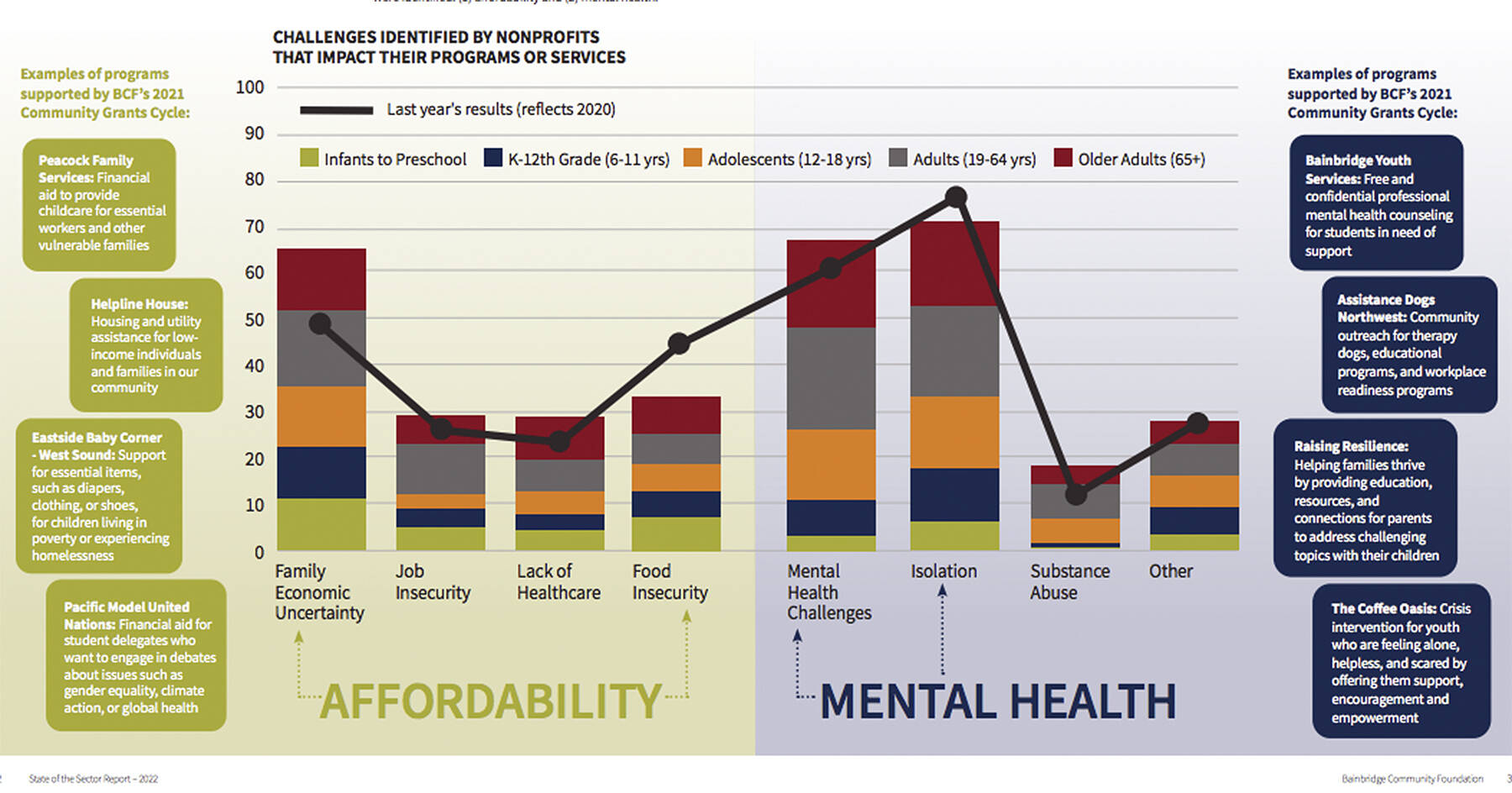Many people suffered mental health problems during the COVID-19 pandemic. Some experts say it could take up to 10 years for the nation to recover.
So Bainbridge Community Foundation gave out 50 grants to nonprofits that deal with that issue. Affordability was another focal point this year.
“We took a deep dive into two particular areas,” said Dana Binnendijk, BCF community impact officer. “All nonprofits deal with those to some extent.”
BCF just released its second “A View of our Community” report, looking at 2022. It uses the report in a number of ways, including making sure it is meeting the needs of the community.
BCF actually doubled the request made by Bainbridge Youth Services because it wanted to make sure help got to youth dealing with mental health issues.
One issue, Binnendijk said, is there are not enough mental health providers — anywhere. But BYS and Helpline can help.
She said about half of the total grants, or $151,000, goes to health and housing nonprofits that help support immigrants, legal services, sexual assault victims and more.
On the other end of the spectrum, BCF supports equal access to the arts, because they “help health,” Binnendijk said. Therapy dogs and animals for low-income people programs also receive funds.
IDES is also important to BCF: Inclusion, Diversity, Equity and Social justice. Helping people with childcare is part of that.
Binnendijk said COVID hit those with low incomes the hardest. The more the financial pressure, the more issues with mental health problems are likely.
As for affordability, Binnendijk said it’s getting harder and harder for people to be able to afford to live on BI. Not only is it expensive for rent or a mortgage, but inflation is also making everything else more costly.
About 48 percent of nonprofits said they have gotten stronger as a result of COVID, having coming up with ways to diversify. They have actually been able to expand by going virtual. Fundraising has been a problem with fewer in-person events.
Vulnerabilities
Last year’s focus was on youth, seniors and single women with children. This year’s is affordability and mental health. Isolation, economics and food insecurity are major concerns of local nonprofits.
BCF helped to fund a number of nonprofits that help in those areas. Other concerns were job insecurity, health care and substance abuse.
Affordability
Housing prices have increased more than 27 percent on BI in the past year. The cost of living also has increased.
The minimum a family of four can make to live on BI/North Kitsap is $78,752. Almost 71 percent of BI residents make at least that much. But that leaves 29 percent who are barely scraping by.
Many of those work for nonprofits, as 78 percent make lesss than $64,190 a year. The median income on BI is $125,861.
Men with bachelor’s degree average $82,000 in pay, while women with the same education average making $60,000. Of households living in poverty, 40 percent are single women with children.
Mental health
COVID-19 has taken its toll on mental health in this country. Anxiety and depression have increased nationwide from 11 percent to 41 percent in the past two years. Isolation, deaths and fear of getting sick were major reasons.
The state Department of Health says such disasters hurt those in the lower-income levels more.
The Healthy Youth Survey shows that BI kids have lower rates of depression but higher rates of anxiety than others statewide. Bainbridge High School students, though, had 87 percent of its students say they were at least moderately hopeful for the future.
Nonprofits
BCF works with nonprofits in four sectors:
• Health, Housing and Human Services;
• Arts, Culture and Humanities;
• Education; and
• Environment, Recreation and Animal Welfare.
In 2017, BI residents took the city’s National Citizen Survey. Their priorities were a credit to the community:
• K-12 education, 93 percent;
• Environment, 91 percent;
• Recreation, 87 percent;
• Culture and Arts, 84 percent;
• Health and Wellness, 80 percent;
• Community Participation, 80 percent;
• Emergency Preparedness, 62 percent;
• Cost of Living, 1 percent; and
• Affordable Housing, 12 percent.
People of BI
Population:
• 24,825, growth of 7.8 percent over 10 years;
• 26.4 percent age 65 and older;
• 77.9 percent 18 and older;
• 22.1 percent under 18.; and
• 4.3 percent under 5.
Gender balance:
• 52 percent female,
• 48 percent male.
Race:
• White 85 percent,
• Asian 3.4 percent.
Education:
• Graduate degree 34 percent,
• Bachelor’s 40 percent,
• Associate’s 6 percent,
• Some college 15 percent,
• High school diploma 5 percent.
Highest grants
1. Bainbridge Youth Services, $24,000
2. Bainbridge Prepares, $18,000
3. Island Volunteer Caregivers, $16,830
4. Knights Community Hospital (new), $16,250
5. Battle Point Astronomical Association, $15,000
6. Vitalize Kitsap, $13,000
7. BI Child Care Center, $12,200
8. Peacock Family Services, $12,000
9. One Heart Wild (new), $11,880
10. Fishline, $11,800.



